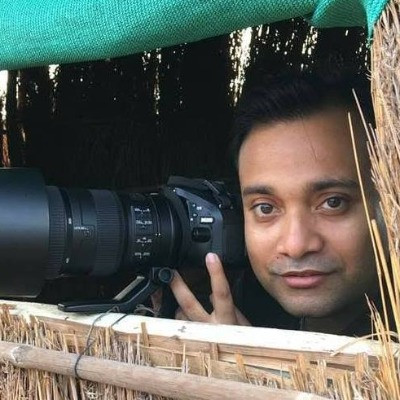Gajoldoba
Set against the backdrop of Khangchendzonga, the reservoir is a birding hotspot that boasts a vast array of migratory avifauna
Moon Jana Roy | Tapash Roy
"The construction of the dam has in turn proved to be a blessing with migratory birds flocking to this landlocked waterbody that is surrounded by forests." Common Merganser or Goosander (Mergus merganser)
Gajoldoba
Situated in the Jalpaiguri district of West Bengal, Gajoldoba is a small hamlet in the Dooars region of the Himalayan foothills. It is famous for the Teesta Barrage Project, the first reservoir that was built in the Teesta basin for irrigation purposes. The construction of the dam has in turn proved to be a blessing with migratory birds flocking to this landlocked water body that is surrounded by forests.
On a winter morning, visitors can enjoy a slow boat ride with the local fishermen on the crystal clear waters of the Teesta river and be enthralled by a vast array of migratory birds, against the backdrop of a snow-covered Khangchendzonga. The surreal beauty of Gajoldoba is what distinguishes it from the other migratory birdwatching hotspots in the country.
Plan Your Trip
Getting there
Air
Bagdogra Airport is the nearest, at approx. 52km from Gajoldoba. It is the gateway airport to the hill stations of Darjeeling, Gangtok, Kurseong, Kalimpong, Mirik and other parts of the North Bengal region, and sees a huge influx of visitors annually. Bagdogra Airport is well-connected with Kolkata, Delhi and other major airports in India. In case a direct flight to Bagdogra is not available, visitors can take a connecting flight from Kolkata.
Rail
The New Jalpaiguri Junction railway station is approx. 33km away from Gajoldoba. It is the largest and busiest railway junction in Northeast India and is well-connected with the rest of the country. Please be sure to book your ticket in advance, or it might prove to be a challenge to get a confirmed ticket.
Road
Siliguri is the largest metropolis in North Bengal. One can hire a car from Siliguri to visit Gajoldoba. It is just an hour’s drive from Siliguri town (approx. 45km). A Volvo bus service is also available between Kolkata and Siliguri (approx. 600km, 14 hours journey). The overall road condition is decent. Some of the good bus service providers along this route are Royal Cruiser and Shyamoli Paribahan.
best time to visit
Gajoldoba remains open throughout the year. But the major attractions here are the birds that visit during winter, making it the best season to visit.
- Winter (November to March): From mid-November, migratory birds from Ladakh, Balochistan, Central Asia, Mongolia, Russia, Siberia, and Europe throng here. The average minimum temperature is between 5°C to 15°C, and the average maximum temperature strays between 25°C to 30°C.
- Summer (April to June): From the last week of March, migratory birds start returning to their breeding grounds and visitors only get to witness a few resident birds during the summer.
- Monsoon (July to October): During the monsoons, the Dooars region receives heavy rainfall and the water level rises substantially. Best to avoid visiting during this period.
History
The story of River Teesta begins 23,000 ft above sea level, from the womb of the Pauhunri glacier in North Sikkim. She then flows through the states of Sikkim and West Bengal and embraces the Brahmaputra River in Bangladesh.
There are many interpretations of the name Teesta; it is believed that the name comes from the Sanskrit word trisrota, which means three tributaries.
The Teesta Barrage Project is one of the largest irrigation projects not only in West Bengal but also in the entire eastern region. It creates 9.22 lakh ha. of irrigation potential in six northern districts of West Bengal and 67.50 MW of hydropower from canal falls.
Stay
Overnight stay at Gajoldoba is not mandatory. Visitors can travel to this location as a day trip from Siliguri. Start early from Siliguri and reach Gajoldoba before 6:30am. But if you want to explore the place better, plan to stay for a minimum of two nights near the Teesta Barrage. There are only a handful of options.
- Bhorer Alo Tourism Property: The Bhorer Alo (the light of dawn) tourism property was set up recently at Gajoldoba near the Teesta Barrage by the West Bengal Tourism Development Corporation Ltd. It is just an hour's drive from Siliguri town. On a cloud-free day, the majestic Mount Khangchendzonga is visible from here. Room tariff for an A/C Cottage is ₹2500 for a night (with breakfast).
- Boroli Resort and Restaurant: Named after the famous fish of River Teesta, Boroli Resort and Restaurant near Gajoldoba is another good option. A double room will cost you ₹2500 for a night (with breakfast).
Saraswatipur Tea Resort: Located within the Baikunthapur forest, the Saraswatipur Tea Resort is a confluence of the tea and tourism industries. It is a beautiful property with luxurious rooms and a gorgeous swimming pool. Room tariff for a double room here is ₹4000 per night (with breakfast). The package includes a visit to the tea estate and the factory.
Gallery
"On a winter morning, visitors can enjoy a slow boat ride with the local fishermen on the crystal clear waters of the Teesta river and be enthralled by a vast array of migratory birds, against the backdrop of a snow-covered Khangchendzonga."
Gajoldoba attracts a large number of migratory birds during the winter period, like the Ruddy Shelduck (Tadorna ferruginea).
The Common Merganser or Goosander (Mergus merganser) is a common sight here.
The boat safari starts from 7am and continues till 3pm, where you can spot birds like the Red-crested Pochard (Netta rufina).
The place is a true haven for birdwatchers, with near-threatened species like the Ferruginous Duck (Aythya nyroca) a common sight.
From mid-November, migratory birds like the Northern Lapwing (Vanellus vanellus) visit here from Ladakh, Balochistan, Central Asia, Mongolia, Russia, Siberia, and Europe.
Resident species like the River Lapwing (Vanellus duvaucelii) are also found aplenty.
Bar-headed Goose (Anser indicus) with a Ruddy Shelduck (Tadorna ferruginea).
Add More Images
See | Do
- Every year, at the onset of winter, millions of birds make arduous and perilous journeys through the Central Asian Flyway (CAF) to enjoy the winter warmth of the Indian subcontinent.
Gajoldoba is a haven for birdwatchers. Common Shelduck, Common Merganser or Goosander, Northern Lapwing, Smew and Tundra Bean-Goose are some of the emblematic species of Gajoldoba.
Other species of migratory birds which are commonly seen here are Great-crested Grebe, Bar-headed Goose, Greylag Goose, Lesser Whistling Duck, Ruddy Shelduck, Cotton Teal, Tufted Duck, Common Teal, Eurasian Wigeon, Spot-billed Duck, Mallard, Great Cormorant, River Lapwing, Grey-headed Lapwing, Black Stork, Little-ringed Plover, Pacific Golden Plover, Kentish Plover, Northern Shoveler, Northern Pintail, Siberian Stone Chat, various species of pochards, gulls and many more.
The reservoir is surrounded by the Baikunthapur forest of the Terai region. If you are lucky, you might get a glimpse of large herds of Asiatic Elephants passing through the surrounding jungles.
Good to know
The boat safari starts at 7am and continues till 3pm. In winter, the daylight tends to get low from 4pm. Narrow country boats are used for birdwatching safaris. A country boat has space for two passengers in addition to the boatman. Rabi Malo (+91 9749368995) is the veteran boatman and guide of Gajoldoba. His birdwatching skills are extraordinary.
Travellers to Gajoldoba need to carry sufficient cash with them, as the lone ATM is quite far away. The hotels accept credit/debit cards but the boatmen and local transport transact in cash.
There are lots of dhabas and restaurants near the Gajoldoba bazaar. Visitors who travel to the wetland on a day trip can eat here.
The sudden loud sound of a cannonball every now and then might leave you perplexed but there is nothing to worry. A certain area of the Teesta riverbank is used as the Indian Army’s artillery testing ground. Cannons and guns will boom all days (except Sunday). Despite the noise, winter birds throng here. Perhaps they are very much used to it.
- During the winter months, the volume of water in Teesta becomes very shallow, and in many places, small islands become visible. One can easily step into the river and stand on the water to take pictures of the migratory birds. Please ensure not to disturb any birds in the process.
- The mega tourism project Bhorer Alo is situated on the outskirts of Pakhibitan Wildlife Sanctuary and Baikunthapur forest. As a part of this project, massive construction work is going on in the area.
- The noise of heavy construction machinery, smoke, dust, human presence and light pollution are potential threats to the migratory birds that visit here. In the recent past, the National Green Tribunal has imposed a ban on the construction work of a helipad and various other works as part of the Bhorer Alo tourism project.
What to pack
Winters are harsh here. Make sure to carry sufficient winter garments.
Personal medicines
Photo IDs
Mosquito repellent
A torch for emergencies
For photographers
A telephoto lens (prime or zoom) of at least 500mm focal length is essential to capture good photographs.
Carry a wide angle lens to capture the magical landscape of Gajoldoba.
A tripod will not be useful for boat safari.
Carry extra camera batteries and memory cards.
Binoculars will be helpful to spot birds.
If required, carry a field guide to identify birds. Boatmen are usually efficient enough to guide you.
Don't Miss
Dooars is known for its treasure of flora and fauna. You can plan to visit some of the well-known forests in the region, like the Gorumara National Park and Chapramari Forest.
Dooars is also famous for its tea. You can visit Saraswatipur Tea Estate, which is closest to Gajoldoba, to get a glimpse of life in a tea estate.
Darjeeling – the "Queen of Himalayas" and other well-known or lesser-known hill destinations in the region are within a distance of approx. 120km. You can plan to spend a few days in any of these hill destinations and experience the serene views of the Himalayas.
Budget per person
- There is no entry fee or camera charge to visit Gajoldoba.
- The cost of a boat safari will range from ₹2000 to ₹2500 for approx. six hours. A country boat can accommodate two passengers in addition to the boatman.
- Accommodation cost ranges between ₹3000 to ₹5000 per day for a double occupancy room. Food will cost extra.
Wednesday, 23 December, 2020
We love a good critique but are infinitely partial to compliments. Both, roars and birdsong are welcome at [email protected]

Moon Jana Roy
Wildlife Photographer
Moon Jana Roy completed her PhD in Environment Communication from Centre for Journalism and Mass Communication, Visva Bharati University. She works as an Assistant Professor at Asutosh College, Kolkata. Moon is also a member of the Himalayan Nature and Adventure Foundation.

Tapash Roy
Wildlife Photographer
Tapash Roy is a digital agriculture professional and has a passion for nature photography. Whenever he gets time from work, he loves to spend time in nature, and he tries to capture a few glimpses of its endless beauty through his camera.
Story recommendations
- Thoothoor
- Muttom
- Kanyakumari
- Manapad
- Dhanushkodi
- Puducherry
- Alamparai
- Chennai
- Andaman & Nicobar
- Andhra Pradesh
- Arunachal Pradesh
- Assam
- Bihar
- Chandigarh
- Chhattisgarh
- Dadra and Nagar Haveli
- Daman and Diu
- NCT of Delhi
- Goa
- Gujarat
- Haryana
- Himachal Pradesh
- Jammu and Kashmir
- Jharkhand
- Karnataka
- Kerala
- Lakshadweep
- Madhya Pradesh
- Maharashtra
- Manipur
- Meghalaya
- Mizoram
- Nagaland
- Odisha
- Puducherry
- Punjab
- Rajasthan
- Sikkim
- Tamil Nadu
- Telangana
- Tripura
- Uttar Pradesh
- Uttarakhand
- West Bengal
